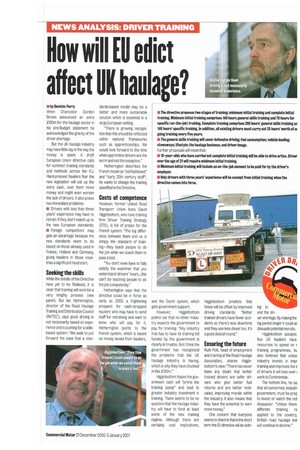How will EU edict affect UK haulage?
Page 13

If you've noticed an error in this article please click here to report it so we can fix it.
• by Dominic Perry When Chancellor Gordon Brown announced an extra £100m for the haulage sector in his pre-Budget statement he acknowledged the gravity of the driver shortage.
But the UK haulage industry may have little say in the way the money is spent. A draft European Union directive calls for common training standards and methods across the EU. Hard-pressed hauliers fear the new legislation will eat up the extra cash, cost them more money and might even worsen the lack of drivers. It also poses two immediate problems: • Drivers with less than three years' experience may have to retrain if they don't match up to the new European standards; • Foreign competitors may gain an advantage because the new standards seem to be based on those already used in France, Holland and Germany, giving hauliers in those countries a significant head start.
Seeking the skills
While the details of the Directive have yet to be finalised, it is clear that training will soon be a vary lengthy process (see panel). But Ian Hetherington, director of the Road Haulage Training and Distribution Council (RFITDC), says good driving is not necessarily based on experience and is pushing for a skillsbased system: "We seek to put forward the case that a stan dards-based model may be a better and more sustainable solution which is essential in a large European setting.
"There is growing recognition that this should be reflected within national frameworks such as apprenticeships. We would look forward to the time when apprentice drivers are the norm and not the exception."
Hetherington describes the French model as "old fashioned" and "early 20th century stuff": he wants to change the training specified in the Directive.
Costs of competence However, former United Road Transport Union boss David Higginbottom, who runs training firm Driver Training Strategy (DTS), is full of praise for the French system: "The big difference between them and us is simply the standard of training—they teach people to do the job while we coach them to pass a test.
You don't even have to fully satisfy the examiner that you understand drivers' hours...this can't be teaching people to do the job competently."
Hetherington says that the directive could be in force as early as 2003: a frightening prospect for cash-strapped hauliers who may have to send staff for retraining and want to know who will pay for it. Hetherington points to the French system, which is based on money levied from hauhers,
and the Dutch system, which gets government support.
However, Higginbottom points out that no other industry expects the government to pay for training: "Any industry that has to have its training bill funded by the government is clearly in trouble. But I think the government has recognised the problems that the UK haulage industry is having, which is why they have chucked in this £100m."
Higginbottom hopes the government cash will "prime the training pump" and lead to greater industry investment in training. There seems to be no question that the haulage industry will have to fund at least some of the new training regime. Although there are certainly cost implications, Higginbottom predicts that these will be offset by improved driving standards: "Better trained drivers have fewer accidents so there's less downtime and they use less diesel too. It's a good deal all round."
Ensuring the future
Ruth Pott, head of employment and training at the Road Haulage Association, shares Higginbottom's view: "There has never been any doubt that better trained drivers are safer drivers who give better fuel returns and are better motivated, improving morale within the industry. It also means that they have the potential to earn more money."
One concern that everyone seems to share is that in the short term the EU directive will do noth
ing to end the dri ver shortage. By making the ing period longer it could ac dissuade potential recruits.
Higginbottom accepts few UK hauliers have resources to spend on r training programmes, bu also believes that unlea industry invests in impr training and improves the ii of drivers it will lose ever work to Continentals.
The bottom line, he sai that all concerned, includin government, must be prep to invest or watch the indi disappear: "Unless there
different training re applied to the country, British road haulage inch will continue in decline."








































































































































